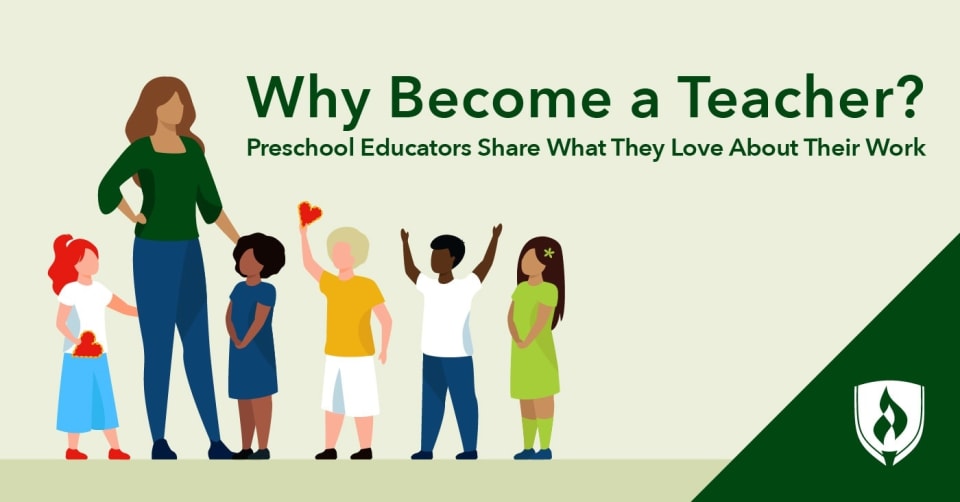Why Become a Teacher? Preschool Educators Share What They Love About Their Work
By Patrick Flavin on 11/08/2021

A job that just pays the bills isn’t cutting it anymore—you want more than that. You’re seeking a meaningful career that will allow you to look in the mirror and be proud of what you do every day. You’ve thought about the prospect of working with and potentially teaching young kids, but you aren’t sure if the job is right for you.
There is nothing in the world like working with young kids. The stories they tell, the faces they make, the laughter and the tears make this job an experience unlike any other. Becoming a preschool teacher means you get to watch children explore the world right as they’re filled to the brim with excitement and wonder.
If you’re considering a career in early childhood education (ECE), it never hurts to hear what people who work in this field love about their jobs. We’ve asked early childhood educators to open up and share what they love about their work. Also, learn more about teacher assistant duties.
I love being an early childhood educator because …
1. Every day is something new
Every day in the classroom is an opportunity for something new. One of the best aspects of working with young kids is, well, the fact that they are young kids, and you never really know what to expect from them. You are going to hear random words sung, spoken or screamed. The relatively mundane things adults take for granted are source of intrigue for kids at this age.
Pre-K teachers get to witness the childhood thrill of discovery firsthand. “At that age, they are absorbing everything they hear and see,” says Brianna Leonhard, early childhood educator and founder of Third Row Adventures. She explains that preschoolers work hard to imitate and achieve new skills, and their joy when they succeed is infectious. “Every time they learn a new letter or how to count to a higher number is like they won the lottery.”
Every day in the classroom is full of these unexpected opportunities for growth—and the fun that comes with it.
2. You build life-shaping relationships
In becoming a preschool teacher, you’re leaving a lasting legacy on the world by influencing the learning of little ones. This alone would be enough to make any job meaningful, but pre-K teaching in particular goes beyond just the passing on of knowledge and into the development of long-lasting relationships.
“Pre-k is such a wonderful age group to teach because they need just as much love and affection as they need actual instruction,” Leonhard says. More than just offering new instruction, a preschool teacher has the rare opportunity to invest in the child and build an educational and developmental foundation that can last a lifetime.
3. Students provide plenty of laughs
One thing the world will always need more of is laughter, and preschool teachers get more than their fair share of unexpected laughs from their work. Much of that humor comes from young children still learning how to navigate social situations and the unwritten rules of how to act in public. For example, Leonhard recalls a story of a student who asked her to call him “little booty cheeks” since that was his nickname at home.
“Four- and five-year-olds have no filters, and it’s often very refreshing!” Leonhard says.
Often these funny little mishaps come from a well-intentioned place. Leonhard also shares the time she arrived at school dealing with an acne breakout on her face, only to have a student earnestly provide these comforting words of wisdom: “It’s ok, I sometimes draw on my face, too, but be more careful next time.”
Ask any pre-K teacher about some of the outlandish things their students have said, and you are sure to get a good laugh.
4. Demand for early childhood educators is strong
While it’s probably not quite as emotionally appealing as some of the other reasons featured on this list, it certainly doesn’t hurt knowing that the employment prospects of qualified ECE professionals appear to be in good shape in the near future.
In fact, from 2020-2030, the Bureau of Labor Statistics (BLS) projects employment opportunities for preschool teachers to grow at a rate (18 percent) that is twice that of what you’ll find for preschool and grade school teachers overall.1 In raw numbers, that projection amounts to an estimated 86,400 new positions nationwide for preschool teachers during that time.1
While it’s certainly not set in stone at this point and the effects will take time to come into focus, the potential for increased government investments in universal pre-K could also help bolster the employment prospects of preschool teachers in the future.
5. The impact of the work is visible
Some careers don’t allow you to really appreciate the results of your work. For some, it’s a matter of getting numbers plugged into a spreadsheet, attached to an email and the rest goes out the window once you’ve hit send. But when you’re working with preschoolers, it’s a different story.
This career is all about the connections you create with your students, according to Kate Fraiser, early childhood consultant at Connect Point Moms. “Connections create cooperation,” Fraiser explains. “If I could go back to my first day of teaching, the advice I would give myself is that staying present in the moment with the person in front of you is the most important thing you can do.”
When you are paying such close attention to your students day in and day out, your connection to them grows. That puts into clear focus the small triumphs and moments of growth they experience along the way—and that never gets old.
6. You’ll be making a difference
At the heart of teaching young children is a desire to pass on knowledge and information to help the next generation make the world a better place. It is the first step on a long educational journey and this first step can be experience forming for the rest of the students’ lives. Stay in the game long enough and you may end up being one of those lucky teachers that gets to watch their former students walk across a stage and accept a diploma all the while knowing you played a role in helping them get there.
Teaching young children is a gift that keeps on giving.
Is an early childhood education career in your future?
There are few jobs in the world that come with the positives teaching preschool has. You get to be a steady force for good in the lives of children who are eager to learn their way about the world. And while it’s not all sunshine—tantrums happen, after all—the good may just outweigh the bad.
Has the insight above piqued your interest in an ECE career? If you are interested in learning more about life as an ECE professional, check out our article “8 Things I Wish I Knew Before Becoming a Preschool Teacher.”
Related Articles:
1Bureau of Labor Statistics, U.S. Department of Labor, Occupational Outlook Handbook, [accessed October, 2021]https://www.bls.gov/ooh/education-training-and-library/preschool-teachers.htm. Information represents national, averaged data for the occupations listed and includes workers at all levels of education and experience. This data does not represent starting salaries. Employment conditions in your area may vary.
The Early Childhood Education programs at Rasmussen University are not designed to meet, and do not meet, the educational requirements for licensure to teach in public preschools, or kindergarten, elementary, or secondary schools in any state. A bachelor’s degree from a state-approved college or university and a state teaching license are typically required to work as a teacher in a public school, and in private school settings. The Rasmussen University Early Childhood Education programs are not approved by any state agency that licenses teachers. States, municipalities, districts, or individual schools may have more stringent licensure requirements and other standards. Childcare facilities and the states in which they are located establish qualifications for staff that work with children, and often implement guidelines regarding age, education, experience, background, and professional development. Before enrolling, it is important to understand all of the licensure eligibility standards for a desired career by consulting the appropriate state and school/facility requirements.
EDITOR'S NOTE: This article was originally published in 2015. It has since been updated to include information relevant to 2021.




